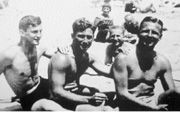“BECAUSE I’M QUEER. I’m gay. I’m homosexual. I’m a poof, I’m a poofter, I’m a ponce. I’m a bumboy, baddieboy, backside artist, bugger. I’m bent. I am that arse bandit; I lift those shirts. I’m a faggot-ass, fudge-packing, shit-stabbing up-hill gardener. I dine at the downstairs restaurant; I dance at the other end of the ballroom. I’m Moses and the parting of the red cheeks . . . and I am not a pervert.”
SEATTLE LESBIAN & GAY FILM FESTIVAL
runs October 20-26 at Egyptian, Little Theatre, and Broadway Perf. Hall
Fervently delivered to his parents by Queer as Folk 2‘s roguish Stuart, this brash coming-out monologue conveys two trends apparent in today’s gay cinema and Seattle’s fifth annual Lesbian & Gay Film Fest. One: Queers are now officially out. Two: Sex is just sex—not a transcendental experience of initiation or a potential harbinger of the plague, but a matter-of-fact phenomenon, like eating or sleeping. So if the closet’s empty and gay audiences have had their fill of AIDS flicks, where do gay filmmakers go from here?
To the past. One of the festival’s finest films is Rob Epstein and Jeffrey Friedman’s 1999 documentary Paragraph 175, which tackles the overlooked subject of Nazi Germany’s persecution of homosexuals. During Hitler’s regime, 100,000 gay men were arrested; 10,000 to 15,000 were sent to concentration camps, and fewer than 10 of these now-aged men survive today. Interviews include a handful of these men and one lesbian (the Nazis deemed lesbianism a “curable condition,” and only a handful of those “afflicted” were sent to the camps). Through fond and painful memories, interviewees construct a secret gay history of Germany, from the “golden years” of ’20s Weimar Berlin to the outed Nazi leader Ernst R�to the Third Reich’s ruthless expansion of the existing antigay German penal code.
MGM film archivist John Kirk will visit for the fest’s Sons of Hercules screening and presumably explain that famous “snails and oysters” exchange between Lawrence Olivier and Tony Curtis in Spartacus. Offering clips from over 70 films, behind-the-scenes hearsay, and interviews with the stars, Sons peeks up the tunic of all those muscle-happy camp classics that followed 1957’s Hercules. Two other historical docs of interest include . . . But I Was a Girl, about a female Dutch symphony conductor who did the drag king thing to dodge the Nazis, and Apostles of Civilised Vice, which relates the events that surprisingly led South Africa to the forefront of the gay civil rights movement.
SPEAKING OF SPECIAL rights, America’s compassionate conservatives will be pleased to discover that gay filmmakers have been brushing up on their family values. Debra Chasnoff, the Academy Award-winning director of It’s Elementary, comes to town with That’s a Family, a combination of interviews and animation that convincingly presents gay and lesbian, single-parent, and adoptive-parent families as viable alternatives to the nuclear family conformity of the post-Cold War era.
Get Your Stuff expresses a similar message, using a sassier tone of voice. A non-PC romp of a movie that recalls The Opposite of Sex, Stuff relates the travails of Eric and Phil, yuppified Beverly Hills homos who take in two “emergency foster kids”— and, later, their alcoholic, streetwalking mom. What begins as a nightmare situation for the couple amusingly turns into a dream scenario for all concerned. The documentary Nuyorican Dream explores the bond—and rift—between a successful gay man and his less fortunate family. Call to Witness documents the splintering of a spiritual family as the Evangelical Lutheran Church in America forces three gay pastors out of the flock.
For racier fare, check out By Hook or By Crook, a digitally shot work-in-progress by punk performers Harriet Dodge (Sister Spit) and Silas Flipper (Tribe 8) concerning a young gender-bending dyke; 101 Rent Boys, a series of interviews with hustlers from the directors of The Eyes of Tammy Faye; and A Boy Named Sue, which documents one woman’s self-realization as a man (without benefit of the Y chromosome).
Whatever you do, don’t miss Queer as Folk 2, the second installment of the groundbreaking British TV series that made the UK choke on its chips. New director Menjah Huda presents the next over-the-top chapter in the lives of those three unforgettable blokes from Manchester: Stuart, the self-serving, egomaniacal Casanova; Vince, his sweet-natured acolyte of a best pal; and Nathan, the fresh-faced 15-year-old finding his way in the gay world. Here, the cheeky trio takes a break from clubbing, drugging, and tricking to spend a little more time pondering their futures. Does Nathan get over Stuart? Do Vince and Stuart finally do the deed? Don’t wait for Showtime’s watered-down version to find out. Judging from Will & Grace, America may not be ready for such a graphic glimpse inside the love lives of queers. But they can always adopt Vince’s fag-hag mum’s advice, delivered to the uncloseted Stuart’s own flabbergasted mother: “Try not to think about the ass thing and you’ll be fine.”








